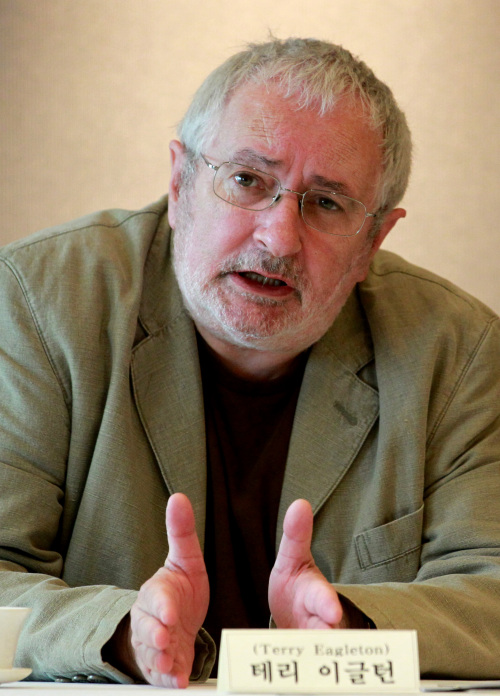Physicist Stephen Hawking, apparently dismissing the need for God in creation by arguing that the universe could be self-forming, is mistaken in his theory, said Terry Eagleton, one of the most influential British literary critics and Marxists, Monday.
“It’s a fascinating theory. But he’s making a very simple mistake, that many atheists and even many Christians make too, to say that God is the creator means God got it all started,” Eagleton said at a press conference in Seoul, prior to his five-day lecture on the humanities in Korea.
“The doctrine of creation has nothing to do with that,” he said.
Hawking, famous for his black hole theory, said in his new book that the universe could have created itself “from nothing” and it was not necessary to “invoke God” to set the universe going.
“It’s a fascinating theory. But he’s making a very simple mistake, that many atheists and even many Christians make too, to say that God is the creator means God got it all started,” Eagleton said at a press conference in Seoul, prior to his five-day lecture on the humanities in Korea.
“The doctrine of creation has nothing to do with that,” he said.
Hawking, famous for his black hole theory, said in his new book that the universe could have created itself “from nothing” and it was not necessary to “invoke God” to set the universe going.

Eagleton made a reference to Christian theologian and philosopher Thomas Aquinas who had said that it was perfectly possible that the universe had no origin.
“Aquinas believed in creation but he did not mean that God started it all up,” said the 67-year-old professor of English Literature at the University of Lancaster.
Eagleton is renowned for his critique of Richard Dawkins’ “The God Delusion,” questioning Dawkins’ understanding of theology.
“If atheism is to be worth debating, it must confront the most impressive, the most subtle and the most complex version of what is pressing. You can’t set up your opponent and proceed to knock him over,” said Eagleton.
Noting that his 2009 book “Reason, Faith and Revolution” has been mistranslated into the Korean title of “In Defense of God,” Eagleton said his book rather talks about an appeal for rational and sophisticated debate about God.
Calling himself a more radical person than he was when he last visited Seoul in 1993, Eagleton stressed that an increasing number of the left and radical thinkers are reflecting on meta-physical beliefs and fundamentals to proceed with their practical ideas.
“The left needs reflections on theology. It can’t be too choosy about where to look,” Eagleton said.
The Marxist strongly criticized how advanced capital societies, including the U.S., took advantage of Christianity as a means of ideology to appeal to certain meta-physical realities even though they have been indifferent to what people actually believed.
“What began as a message of good news to the poor very rapidly became a defense of status quo. That kind of religious belief seems to be pretty worthless,” he said.
What is wrong with the conservatism, or what he calls “liberal humanism,” is fundamentally believing that having the status quo is not that bad or even better in the future.
On the other hand, “tragic humanism,” is to believe that it is impossible to move forward unless you face the worst.
Christianity was one body of tragic humanism in that Romans had to torture and crucify the “criminal,” Jesus Christ. Socialism and Marxism were also based on the tragic humanism of “breaking and remaking,” he said.
He urged literary theorists to come back to the “ambitious and thorough-arguing critique,” which flourished particularly from the 1960s to 1980s along with the left-wing movement.
Eagleton, who took his first lecture on “Faith and Foundationalism” at Korea University on Monday, is to offer second and third lectures in Seoul on Tuesday and Wednesday, a fourth in Gwangju in South Jeolla Province on Thursday and the fifth in Daegu in North Gyeongsang Province on Friday. For more information, call Korea University on (02) 3290-1065.
By Kim Yoon-mi (yoonmi@heraldcorp.com)







![[Hello India] Hyundai Motor vows to boost 'clean mobility' in India](http://res.heraldm.com/phpwas/restmb_idxmake.php?idx=644&simg=/content/image/2024/04/25/20240425050672_0.jpg&u=)










